Vector Motors: The Rise and Fall of the Original American Supercars
Published on Thu, Oct 24, 2019
By: Collin Morgan
Los Angeles-based Vector Motors was once an ambitious adventure to dethrone European supercars with American automobiles. So, what happened?
Featured photo: Vector W8. Pawel Litwinski ©2014 Courtesy of RM Auctions.

The Rise of Vector Motors
As we chronicle the rise and fall of Vector Motors, let’s start in the 1970’s, as many crazy stories do. 1978 was an interesting year. Jim Jones and the punch, Volkswagen halting production of the Beetle after nearly 30 years, and showings of Grease clogging up movie theaters headlined the year.
The Oil Shock of 78-79 was just gaining traction, and memories of the American Oil Crisis were flooding back. Japanese imports accounted for half of the U.S. import market due to the demand for fuel efficient cars. The people wanted small, high MPG grocery-getters, and that begs the question: why was there an American concept car released that looked like a Bowie knife with wheels?
In comes the Vector W2, America’s response to the ‘Supercar Elites’ of Europe.
Vector W2
Vector Motors was originally founded in 1971 by Gerald Wiegert in Wilmington, California. Wiegert and a popular auto body expert named Lee Brown teamed up under the name ‘Vehicle Design Force’ and created a concept called the Vector. Unfortunately, this car never made it to production and instead, the research was diverted to a new model: the W2.
The prototype had angles that glinted like a sword and was reminiscent of the Bertone-designed Countach, but somehow looked more wicked, and would fit in Los Angeles appropriately. Inside, a twin-turbo aluminum 350 Chevy V8 paired with GM’s 3-speed automatic transmission put down over 650 horsepower with a rumored top speed of 230 mph.
That was insane in 1978.
The car was very well received and gained an impressive amount of attention from the likes of Motor Trend and Top Gear. However, Top Gear was oddly ordered not to do a speed test on the car. Between 1978-1989, the concept traveled over 100,000 miles, the furthest of any concept.
Vector W8

However, in 1989, Wiegert’s campaign against the exotics of Europe peaked with the release of the Vector W8 twin-turbo. This was a collection of improvements made from the W2, including a 6.0L Rodeck aluminum racing engine boosted by two Garrett turbochargers, and boasted 625 horsepower and 649 lb-ft of torque.
On the skidpad, the W8 generated 0.97g of acceleration and was the highest in its class.
On the inside, the car was outfitted with luxurious amenities typically omitted from other exotics. Electronically adjustable Recaro racing seats were positioned slightly closer to the middle of the cockpit to improve driver experience.
Wool carpeting, suede and leather upholstery completed the lavish interior, and the dashboard eerily resembled typical fighter jet controls. At a price tag of $455,000, seventeen W8’s were built for public sale.

This sounds like a recipe for a car worthy of generational legends, right? Wrong.
As far as publicity is concerned, nearly everything went wrong for Vector. Tennis star Andre Agassi requested a refund for his W8 as a result of the wool carpeting burning due to the exhaust. All three cars provided to Car and Driver broke down in various ways and none of them were fit for testing.
The car had the looks and the stats to back it up yet negative publicity brought the monster to its knees.
The Fall of Vector Motors
Vector WX-3

In 1993, Wiegert debuted the successor of the W8: the WX-3. Diverting from the sharp angles, the WX-3 received some curves and a top tier engine option that included a 1200 horsepower 7.0L twin-turbo V8. However, this is where the story gets insane.
Indonesian company Megatech, sounding like an intergalactic space villain, acquired the controlling interest in Vector. Upon his return from the Geneva Auto Show in 1993, Wiegert was asked to relinquish the company, which he furiously refused. Vector HQ was placed under a physical lock down, and Gerald Wiegert was fired from his own company.

At the time, Megatech owned Lamborghini as well, and created the largely disgraced M12 using the Lamborghini Diablo 5.7L V12 engine (to decrease production costs), and was described by Autoweek as the worst car they had ever tested.
Battered by failure, Megatech sold Lamborghini to Audi but retained Vector. Lamborghini now wanted payment for the engines, but Megatech had no payment available; except an unsold Vector W8. Lamborghini accepted, and the car still resides in the claws of the Italians to this day.
In 1999, Megatech folded, taking Vector Motors along with it.
A bit of hope?
Vector WX-8
While the crash and burn of America’s Supercar optimism was indeed deflating, there is hope. Wiegert acquired the crumbling ruin of his company back, and in 2006, confirmed that a new supercar was in the works.
At the 2007 L.A. AutoShow, the new WX-8 prototype was unveiled, but it’s been quiet since then.
However, most recently, two WX-3 prototypes have been listed for sale in 2018 to fund the improved WX-8, and the specs are insanity in list-form. There are two options as far as the engine is concerned: a 7.8L and a 10.0L with different turbo configurations.
For instance, top of the line specs include 1850+ horsepower, 0-60 mph in 2.3 seconds, and a 300-mph top speed. Tell me that isn’t mind-boggling. And yes, this car is being built in Wilmington, CA.
Can we applaud this grit through adversity loud enough? Gerald Wiegert embodies the American drive perfectly, and look at what he’s got in the works. If the WX-8 makes it to production, it would establish America as a real competitor with Ferrari, Bugatti, and all those European behemoths.
Keep an eye on Wilmington, as a new hypercar goliath might soon be representing the Stars and Stripes.
For updates on the WX-8 concept, check Vector’s website out: http://www.vectormotors.com/




